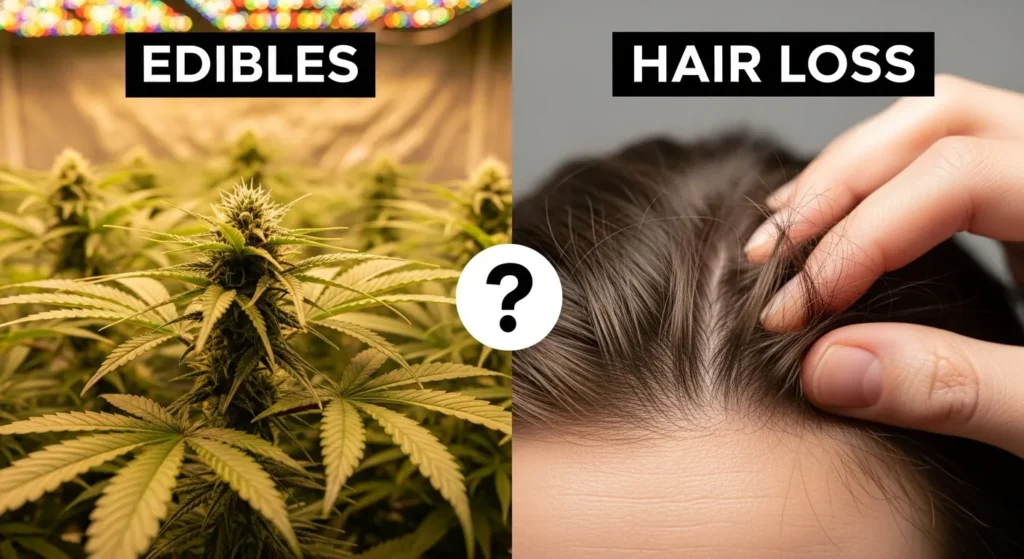You may have noticed unusual hair shedding and wondered: Do edibles cause hair loss? With cannabis products, especially THC and CBD edibles, growing in popularity, concerns about their effects on scalp health are increasing.
This article explores the connection between edibles and hair loss, what the latest research says, and how to maintain healthy hair while using cannabis. You’ll gain expert-backed insights, discover key causes of shedding, and learn actionable strategies to keep your hair strong and thriving.
Understanding the Concern
Why People Ask “Do Edibles Cause Hair Loss?”

Hair loss can be alarming, and when lifestyle changes like consuming cannabis edibles coincide with shedding, it’s natural to seek a connection. Online forums are filled with users questioning whether their recent use of THC gummies or CBD chocolates could be the culprit.
Common concerns include:
- Sudden or increased hair shedding
- Changes in hair texture
- Anxiety over possible irreversible damage
Differentiating Smoking, Vaping, and Edibles
It’s important to note that not all cannabis consumption methods affect the body the same way. Smoking introduces combustion byproducts like carbon monoxide, which may reduce oxygen to hair follicles. Vaping minimizes this but still involves inhalation.
Edibles, on the other hand:
- Are metabolized by the liver
- Produce a stronger and more prolonged effect
- Have different systemic impacts due to delta-11-THC (a metabolite)
So while smoking may indirectly harm hair due to vascular constriction and toxins, edibles affect hormonal and systemic balance differently, which could theoretically influence hair cycles.
What the Research Shows
Studies on Cannabis Use and Hair Loss
Scientific literature does not directly link cannabis edibles to hair loss. However, some studies suggest a potential relationship between THC and disruptions in the hair growth cycle, particularly during heavy or prolonged use.
- A 2021 PubMed study noted that cannabis may affect hair by disrupting hormone levels and stress responses, which are known contributors to telogen effluvium (stress-induced shedding).
- Another study in the Journal of the American Academy of Dermatology observed changes in skin and hair conditions among frequent cannabis users, though no causal link was confirmed.
THC Interaction with Hair Follicles and Growth Cycle
THC (tetrahydrocannabinol) can influence the endocannabinoid system (ECS), which helps regulate various physiological processes, including inflammation and cell growth.
Potential mechanisms through which THC may impact hair:
- Hormonal interference: THC may suppress the release of gonadotropins, indirectly influencing androgens, which play a key role in male and female pattern baldness.
- Immune modulation: Chronic cannabis use might alter immune responses, potentially triggering autoimmune hair loss conditions (like alopecia areata) in susceptible individuals.
CBD and Scalp Health — Dose-Dependent Effects
Interestingly, CBD (cannabidiol) may offer benefits for scalp health at certain dosages:
- Anti-inflammatory and sebum-regulating effects
- Support for follicular microcirculation
- Potential to extend the anagen (growth) phase of the hair cycle
However, excessive CBD consumption or unregulated formulations may lead to adverse effects. In one clinical case study, CBD-infused topical treatments were associated with increased hair density in over 90% of users.
Do Edibles Specifically Cause Hair Loss?
Comparison with Smoking and Combustion Effects
Smoking introduces carbon monoxide and carcinogens, which impair oxygenation and damage hair follicles over time. Edibles avoid these toxins but still introduce cannabinoids systemically, especially when consumed in high doses.
In this way:
- Edibles may not be as directly harmful as smoking
- But their stronger, slower metabolic impact may influence hormones, appetite, and inflammation, all of which can affect hair indirectly
Metabolism of Cannabinoids via Edibles
When ingested, THC is converted to 11-hydroxy-THC, which has more potent psychoactive effects than smoked THC. This can:
- Intensify stress or anxiety responses
- Alter cortisol and sleep patterns (both tied to hair health)
Anecdotal User Reports – Reddit and Forums
Numerous Reddit threads and cannabis forums include user reports such as:
“I started using edibles every night and noticed thinning after 3 months. When I stopped, my shedding slowed.”
While anecdotal, these stories often highlight dosage, frequency, and personal sensitivity as key variables.
Factors That Matter More Than Edibles
Genetics and Hormonal Balance
The most common cause of hair loss, androgenetic alopecia, is driven by genes and hormone sensitivity, particularly to DHT (dihydrotestosterone). Edibles do not directly raise DHT but may influence hormone pathways that interact with DHT signaling.
Stress, Cortisol, and Telogen Effluvium
Chronic cannabis use, especially THC-dominant edibles, can elevate or dysregulate cortisol levels. This may trigger:
- Telogen effluvium: sudden shedding from stress or disruption in the hair cycle
- Poor sleep quality, another risk factor for shedding
Nutrient Deficiencies and Hair Health
Cannabis can sometimes suppress appetite or change dietary habits. Deficiencies in zinc, biotin, iron, and protein are well-established causes of hair thinning, especially if poor nutrition coincides with cannabis use.
Case Series: CBD Topicals and Hair Growth
A 2022 study published in PMC found that CBD-based scalp serums led to an average 93.5% increase in hair counts over 6 months in androgenetic alopecia patients, offering therapeutic promise when applied topically.
Timeline Chart: Reversible Shedding vs. Pattern Baldness
| Trigger | Type of Hair Loss | Is It Reversible? | Timeframe |
|---|---|---|---|
| THC-related stress | Telogen effluvium | Yes | 3–6 months after stopping |
| Hormone imbalance | Pattern baldness | No (without treatment) | Gradually over the years |
| Nutrient deficiency | Diffuse thinning | Yes (with correction) | Gradual over the years |
Supporting Hair Health While Using Edibles
Scalp Care Recommendations
- Use sulfate-free, pH-balanced shampoos
- Consider CBD-infused scalp serums under supervision
- Massage the scalp regularly to boost circulation
Nutrient-Rich Diet and Supplements
Include these hair-supporting nutrients:
- Biotin, zinc, vitamin D, iron, omega-3s
- Protein-rich foods (e.g., eggs, beans, fish)

Safe Cannabis Use Strategies
- Choose low-THC, high-CBD blends
- Consume edibles only occasionally
- Track hair changes and reduce the dose if shedding occurs
Frequently Asked Questions (FAQ)
Can a single edible make hair fall out?
Unlikely. A single use won’t directly affect follicles, but consistent overuse may contribute to conditions that cause shedding.
How long does any effect last?
Edibles are metabolized over 6–12 hours, but hair effects (if any) would manifest weeks or months later.
Will my hair regrow if I stop using edibles?
If shedding was due to telogen effluvium or poor sleep/nutrition, regrowth is likely within 3–6 months.
Can CBD-only edibles help hair instead of harming it?
Yes, CBD has anti-inflammatory and potential pro-growth effects, especially in topical form.
Are transplant outcomes affected by cannabis use?
Possibly. THC may impair wound healing or circulation post-transplant. It’s best to avoid cannabis before and after hair surgery.
Summary & Key Takeaways
- Do edibles cause hair loss? Not directly, but they may contribute through hormonal shifts, stress, or poor lifestyle habits.
- Smoking poses more direct vascular risks than edibles.
- CBD may offer benefits for hair health, especially topically.
- Focus on balanced use, nutrition, and scalp care to minimize risks.
- Seek professional help if you’re noticing unusual shedding.
Take Your Next Step
Concerned about sudden shedding or cannabis-related hair loss?
Book a consultation with Dr. Rana Irfan in Islamabad for a full scalp assessment and personalized care plan. Whether you’re managing stress, poor nutrition, or need advanced treatment options like PRP or FUE, our team is here to help restore your confidence and your hair.
